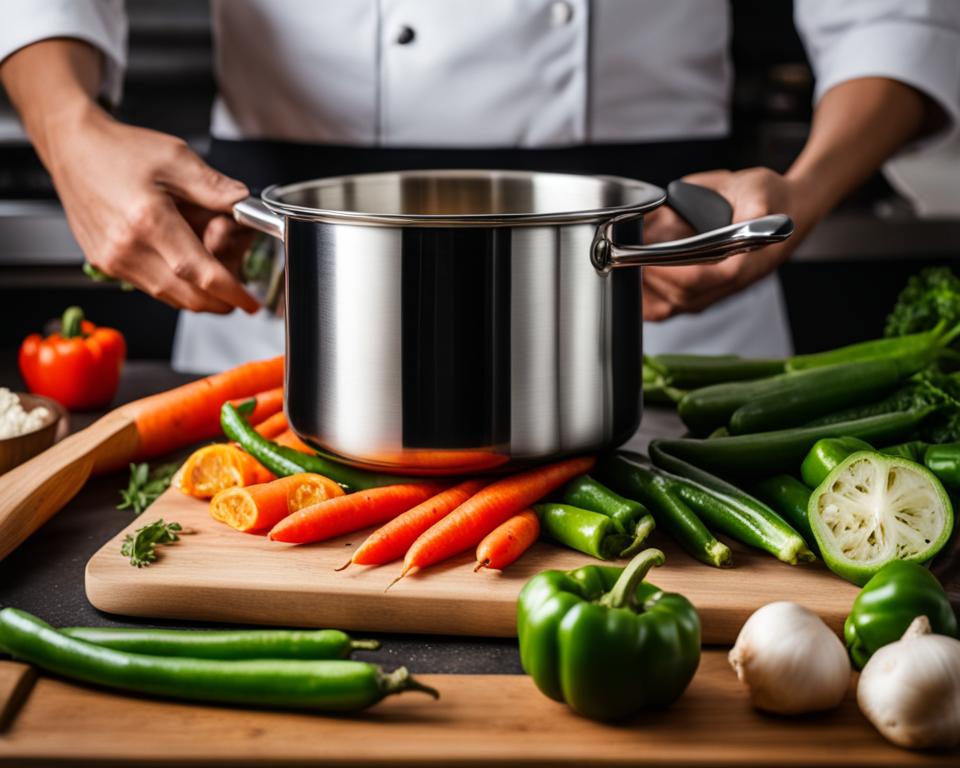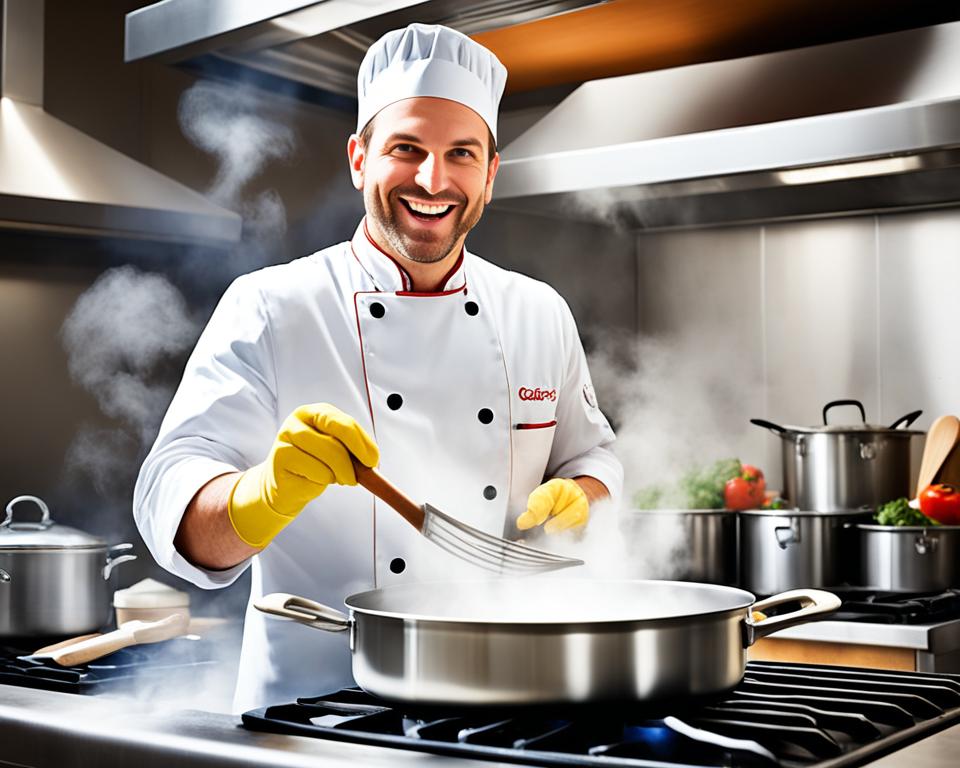What is the best cleaner for cooking pans?
There are many different types of cooking pans on the market, and each type requires a different cleaning method. Some of the most common types of cooking pans include:
* Stainless steel pans
* Nonstick pans
* Cast iron pans
* Copper pans
* Ceramic pans
The best cleaner for each type of cookware will depend on the material of the pan and the type of food that has been cooked in it. For example, stainless steel pans can be cleaned with a mild detergent and water, while nonstick pans should not be cleaned with harsh chemicals or abrasive materials.
Here is a general guide to cleaning different types of cooking pans:
* Stainless steel pans: Wash with a mild detergent and water. Do not use abrasive cleaners or scouring pads, as these can damage the nonstick coating.
* Nonstick pans: Wash with a mild detergent and water. Do not use abrasive cleaners or scouring pads, as these can damage the nonstick coating.
* Cast iron pans: Wash with hot water and a stiff brush. Do not use soap, as this can remove the seasoning from the pan.
* Copper pans: Wash with a mild detergent and water. Do not use abrasive cleaners or scouring pads, as these can damage the copper finish.
* Ceramic pans: Wash with a mild detergent and water. Do not use abrasive cleaners or scouring pads, as these can damage the ceramic finish.
If you have a stubborn stain on your cooking pan, you can try soaking it in a solution of white vinegar and water. You can also use a commercial cookware cleaner, but be sure to follow the directions on the label.
To prevent your cooking pans from getting dirty, you can:
* Wash them immediately after each use.
* Use a nonstick cooking spray to prevent food from sticking to the pan.
* Store your cooking pans in a dry place.
By following these tips, you can keep your cooking pans clean and looking their best.
II. The Different Types of Cookware
There are many different types of cookware available on the market, each with its own unique set of features and benefits. Some of the most common types of cookware include:
- Stainless steel
- Aluminum
- Cast iron
- Copper
- Nonstick
Each type of cookware has its own advantages and disadvantages, so it’s important to choose the right type for your needs. For example, stainless steel is a good choice for general cooking, while cast iron is better suited for searing and browning.
You should also consider the size and shape of your cookware when making a purchase. Make sure to choose pots and pans that are large enough to accommodate the foods you cook most often.
III. The Best Cleaner for Each Type of Cookware
The best cleaner for each type of cookware will vary depending on the material of the cookware. Here is a general guide to the best cleaners for different types of cookware:
* **Stainless steel:** Mild dish soap and warm water is usually sufficient to clean stainless steel cookware. If the cookware is heavily soiled, you can use a commercial stainless steel cleaner or a paste made of baking soda and water.
* **Nonstick cookware:** Use a nonabrasive cleaner specifically designed for nonstick cookware. Avoid using harsh chemicals or abrasive cleaners, as these can damage the nonstick coating.
* **Cast iron:** Cast iron cookware should be cleaned with hot water and a mild dish soap. Do not use abrasive cleaners or scouring pads, as these can damage the seasoning on the cast iron.
* **Copper cookware:** Copper cookware should be cleaned with a mild acid, such as vinegar or lemon juice. Do not use abrasive cleaners or scouring pads, as these can damage the copper.
* **Glass cookware:** Glass cookware can be cleaned with mild dish soap and warm water. Do not use abrasive cleaners or scouring pads, as these can scratch the glass.
How to Clean Cookware Safely
When cleaning cookware, it is important to use safe methods that will not damage the material. Here are some tips for cleaning cookware safely:
- Use a mild detergent and warm water.
- Avoid using harsh chemicals or abrasive cleaners.
- Do not use steel wool or other abrasive materials on nonstick cookware.
- Rinse cookware thoroughly after cleaning.
- Dry cookware completely before storing.
By following these tips, you can help to keep your cookware clean and in good condition.
V. Natural Cookware Cleaning Methods
There are a number of natural cleaning methods that you can use to clean your cookware. These methods are often just as effective as commercial cleaning products, but they are less harsh on your cookware and the environment.
Here are a few natural cleaning methods that you can try:
- Use baking soda and vinegar.
- Use lemon juice and salt.
- Use dish soap and water.
- Use a commercial oven cleaner.
For more information on natural cleaning methods, please see our article on Natural Cleaning Methods for Cookware.
VI. Commercial Cookware Cleaning Products
There are a variety of commercial cookware cleaning products available on the market. Some of the most popular brands include:
* Dawn
* Mr. Clean
* Scrubbing Bubbles
* Comet
* Ajax
These products are typically designed to remove grease, grime, and food residue from cookware. They can be used on a variety of surfaces, including stainless steel, nonstick, and cast iron.
When choosing a commercial cookware cleaning product, it is important to consider the type of cookware you have. Some products are specifically designed for certain types of cookware, while others can be used on all types. It is also important to read the label carefully to make sure that the product is safe to use on your cookware.
Commercial cookware cleaning products can be effective in removing tough stains and buildup. However, they can also be harsh on your cookware and may damage the finish. It is important to use these products sparingly and to follow the directions on the label carefully.
Here are some tips for using commercial cookware cleaning products:
* Test the product on a small area of your cookware before using it on the entire surface.
* Use the product according to the directions on the label.
* Rinse your cookware thoroughly after cleaning it.
* Dry your cookware completely before storing it.
If you are concerned about the safety of using commercial cookware cleaning products, there are a number of natural cleaning methods that you can try. These methods are typically less harsh on your cookware and may be more effective in removing stubborn stains.
Here are some natural cleaning methods for cookware:
* **Baking soda and vinegar:** Mix equal parts baking soda and vinegar in a bowl. Apply the mixture to your cookware and let it sit for 15-30 minutes. Rinse your cookware thoroughly and dry it completely.
* **Lemon juice and salt:** Rub a lemon wedge over your cookware. Sprinkle salt on the surface and let it sit for 15-30 minutes. Rinse your cookware thoroughly and dry it completely.
* **White vinegar:** Pour white vinegar into a pot or pan and bring it to a boil. Let the vinegar boil for 5-10 minutes. Remove the pot or pan from the heat and let it cool completely. Rinse your cookware thoroughly and dry it completely.
VII. How to Prevent Cookware from Getting Dirty
There are a few things you can do to prevent your cookware from getting dirty in the first place.
- Wash your cookware immediately after each use.
- Use a soft cloth or sponge to clean your cookware.
- Avoid using harsh chemicals or abrasive cleaners on your cookware.
- Store your cookware properly to prevent it from getting scratched or damaged.
By following these tips, you can help keep your cookware clean and looking its best for years to come.
Tips for Cleaning Cookware That Is Stuck or Burned
VIII. Tips for Cleaning Cookware That Is Stuck or Burned
If your cookware is stuck or burned, there are a few tips that you can try to clean it.
First, try using a non-abrasive cleaning pad and a mild detergent. If that doesn’t work, you can try using a vinegar and baking soda solution. To do this, mix equal parts vinegar and baking soda in a bowl. Then, pour the solution onto the cookware and let it sit for a few minutes. Finally, scrub the cookware with the cleaning pad and rinse it with water.
If the cookware is still stuck or burned, you can try using a commercial cookware cleaner. Be sure to follow the directions on the product label.
If you are unable to clean the cookware yourself, you can take it to a professional for cleaning.
IX. When to Replace Your Cookware
There are a few signs that it may be time to replace your cookware. These include:
- The cookware is scratched or damaged.
- The cookware is no longer nonstick.
- The cookware is leaching chemicals into your food.
- The cookware is too heavy or bulky for your needs.
If you are not sure whether or not it is time to replace your cookware, you can consult with a professional.


